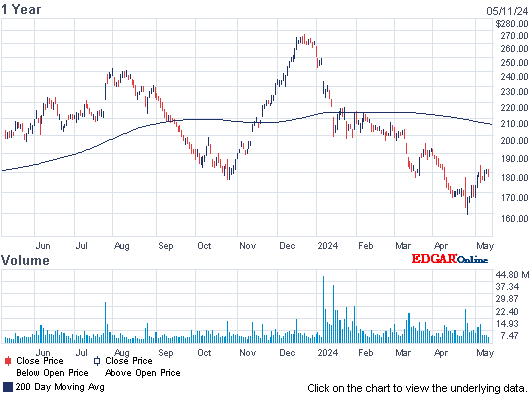Dow lost 130, decliners over advancers 3-2 & NAZ fell 59. The MLP index had another down day, dropping 7+ to the 441s, while the REIT index added 3+ to the 336s. Junk bond funds were mixed & Treasuries rallied, taking the yield on the 10 year Treasury to 1.96%. Oil plunged to the low 48s & gold rose to 3-week
high weeks after Europe’s economic concerns mounted, spurring
demand for a safe haven.
AMJ (Alerian MLP Index tracking fund)
![Live 24 hours gold chart [Kitco Inc.]](http://www.kitco.com/images/live/gold.gif?0.4106044252934048)

The cost of insuring Russian bonds against default rose to the highest level in almost 6 years on speculation a cut in the nation’s credit rating to junk is imminent. 5-year credit default swaps jumped 56 basis points to 594, the most since Mar 2009 & the 5th-highest sovereign globally. The contracts rose 118 basis points in the past 3 days. Russia's investment-grade status is being tested after the price of oil, its main export earner, more than halved in value since Jun & sanctions over the conflict in Ukraine threaten the economy with a recession. S&P said last month it will probably lower Russia to non-investment grade within 90 days. Fitch Ratings will announce the results of its credit-rating review on Fri. S&P, which said it will conclude its review of the sovereign’s BBB- rating in mid-Jan, put it on negative watch based on “what we view as a rapid deterioration of Russia’s monetary flexibility and the impact of the weakening economy on its financial system,” it said 2 weeks ago. A cut by Fitch, which currently rates the nation 2 steps above junk with a negative outlook, to BBB- is “almost a certainty,” while junk status from S&P may be forthcoming. Only Venezuela, Ukraine, Greece & Pakistan have more expensive credit-default swaps. The penalties imposed by the US & its allies have locked Russian corp borrowers out of intl debt markets. That pushed the gov to rush legislation thru parliament last month allowing the Deposit Insurance Agency to buy stakes in banks before they face bankruptcy proceedings to keep the system stable. Russia’s foreign-currency reserves fell by $10B to $388B last week. Moody’s Investors Service cut Russia’s credit score one level to its 2nd-lowest investment grade in Oct, citing concern that the sanctions will hurt its economy. The continued erosion of Russia’s foreign-exchange reserves because of capital flight, low oil prices & borrowers’ lack of access to credit were also cited by Moody’s. The economy of the world’s largest energy exporter could shrink 2.3% this year. The gov gets about 50% of its budget revenue from oil & natural-gas industries.
Russia Credit Risk Soars to Six-Year High as Ruble Slides Amid Oil Rout
Photo: Bloomberg
Boeing, a Dow stock, delivered a record number of planes in 2014 as it accelerated production to surpass its goal for the 787 Dreamliner. Deliveries of the carbon-fiber jet rose 75 % to 114, boosted by a surge in Q4. The company delivered 723 total planes during the year, up 12% from 2013 & in its forecast range of 715-725. Rising deliveries are critical as BA looks to convert its sizable backlog into steady revenue streams, particularly on the money-losing Dreamliner, since the company receives payments when customers accept planes. It booked a record 1432 net orders, valued at $232B at list prices. The includes 1104 orders for its single-aisle 737. BA, benefiting as carriers upgrade their fleets amid rising global air travel, is set to retain its position as the world’s largest planemaker, edging out Airbus for the 3rd consecutive year. BA boosted its Dreamliner output 3X in just over a year, to a rate of 10 planes per month by early 2014, as it looked to increase production efficiency & turn a profit on the jet. The 114 Dreamliner deliveries surpassed Boeing’s goal of 110, aided by its busiest 3-month stretch ever in Q4 when it handed off 35. BA delivered 485 of its top-selling 737s as the company attempts to surpass Airbus’s annual narrow-body total for the first time since 2002. Unfulfilled commercial orders reached an all-time high of 5789 at the end of 2014. The stock fell 1.52 in a weak market. If you would like to learn more about BA, click on this link:
club.ino.com/trend/analysis/stock/BA?a_aid=CD3289&a_bid=6ae5b6f7
Boeing Beats 787 Goal as Jetliner Deliveries Reach Record

Bill Gross, former manager of the world’s largest bond fund, said prices for many assets will fall this year as record-low interest rates fail to restore sufficient economic growth. With global expansion still sputtering after years of interest rates near zero, investors will gradually seek alternatives to risky assets, Gross wrote in an investment outlook for Janis Capital (JNS), where he runs the $1.2B Janus Global Unconstrained Bond Fund. “When the year is done, there will be minus signs in front of returns for many asset classes,” he wrote. “The good times are over.” 6 years after the end of the financial crisis, borrowing costs in the world’s richest nations are stuck near zero, a sign investors have little confidence that their economies will strengthen. He argued the Federal Reserve won’t raise interest rates until late this year if at all as falling oil prices & a stronger US dollar limit the central bank’s room to increase borrowing costs. While timing the end of a bull market is difficult, the next 12 months will probably see a turning point, Gross wrote. “Knowing when the ‘crowd’ has had enough is an often frustrating task, and it behooves an individual with a reputation at stake to stand clear,” he said. “As you know, however, moving out of the way has never been my style.” Gross, who earned his reputation by building a $2T money manager with some of the industry’s highest returns, has in recent years stumbled in the bond market as his former flagship fund trailed a majority of competitors in 3 out of the past 4 years.
Bill Gross Says the Good Times Are Over
The only good part of trading today is Dow finished well off the lows (although there was selling into the close). Bargain hunters returned to a very oversold market. Of course, that says little about the longer term outlook which is not rosy. Enterprise Products (EPD), by some measures the largest MLP, raised the quarterly dstribution 2 pennies to 37¢, but the units still fell 83¢ to 33.57 in this down market for MLPs. At least, this is a sign that the MLP is still alive. Venturesome investors will be looking for bargin MLPs with higher yields.
Dow Jones Industrials
AMJ (Alerian MLP Index tracking fund)
| CLG15.NYM | ....Crude Oil Feb 15 | ....47.83 | (4.4%) |
![Live 24 hours gold chart [Kitco Inc.]](http://www.kitco.com/images/live/gold.gif?0.4106044252934048)

The cost of insuring Russian bonds against default rose to the highest level in almost 6 years on speculation a cut in the nation’s credit rating to junk is imminent. 5-year credit default swaps jumped 56 basis points to 594, the most since Mar 2009 & the 5th-highest sovereign globally. The contracts rose 118 basis points in the past 3 days. Russia's investment-grade status is being tested after the price of oil, its main export earner, more than halved in value since Jun & sanctions over the conflict in Ukraine threaten the economy with a recession. S&P said last month it will probably lower Russia to non-investment grade within 90 days. Fitch Ratings will announce the results of its credit-rating review on Fri. S&P, which said it will conclude its review of the sovereign’s BBB- rating in mid-Jan, put it on negative watch based on “what we view as a rapid deterioration of Russia’s monetary flexibility and the impact of the weakening economy on its financial system,” it said 2 weeks ago. A cut by Fitch, which currently rates the nation 2 steps above junk with a negative outlook, to BBB- is “almost a certainty,” while junk status from S&P may be forthcoming. Only Venezuela, Ukraine, Greece & Pakistan have more expensive credit-default swaps. The penalties imposed by the US & its allies have locked Russian corp borrowers out of intl debt markets. That pushed the gov to rush legislation thru parliament last month allowing the Deposit Insurance Agency to buy stakes in banks before they face bankruptcy proceedings to keep the system stable. Russia’s foreign-currency reserves fell by $10B to $388B last week. Moody’s Investors Service cut Russia’s credit score one level to its 2nd-lowest investment grade in Oct, citing concern that the sanctions will hurt its economy. The continued erosion of Russia’s foreign-exchange reserves because of capital flight, low oil prices & borrowers’ lack of access to credit were also cited by Moody’s. The economy of the world’s largest energy exporter could shrink 2.3% this year. The gov gets about 50% of its budget revenue from oil & natural-gas industries.
Russia Credit Risk Soars to Six-Year High as Ruble Slides Amid Oil Rout
Boeing, a Dow stock, delivered a record number of planes in 2014 as it accelerated production to surpass its goal for the 787 Dreamliner. Deliveries of the carbon-fiber jet rose 75 % to 114, boosted by a surge in Q4. The company delivered 723 total planes during the year, up 12% from 2013 & in its forecast range of 715-725. Rising deliveries are critical as BA looks to convert its sizable backlog into steady revenue streams, particularly on the money-losing Dreamliner, since the company receives payments when customers accept planes. It booked a record 1432 net orders, valued at $232B at list prices. The includes 1104 orders for its single-aisle 737. BA, benefiting as carriers upgrade their fleets amid rising global air travel, is set to retain its position as the world’s largest planemaker, edging out Airbus for the 3rd consecutive year. BA boosted its Dreamliner output 3X in just over a year, to a rate of 10 planes per month by early 2014, as it looked to increase production efficiency & turn a profit on the jet. The 114 Dreamliner deliveries surpassed Boeing’s goal of 110, aided by its busiest 3-month stretch ever in Q4 when it handed off 35. BA delivered 485 of its top-selling 737s as the company attempts to surpass Airbus’s annual narrow-body total for the first time since 2002. Unfulfilled commercial orders reached an all-time high of 5789 at the end of 2014. The stock fell 1.52 in a weak market. If you would like to learn more about BA, click on this link:
club.ino.com/trend/analysis/stock/BA?a_aid=CD3289&a_bid=6ae5b6f7
Boeing Beats 787 Goal as Jetliner Deliveries Reach Record
Boeing (BA)
Bill Gross, former manager of the world’s largest bond fund, said prices for many assets will fall this year as record-low interest rates fail to restore sufficient economic growth. With global expansion still sputtering after years of interest rates near zero, investors will gradually seek alternatives to risky assets, Gross wrote in an investment outlook for Janis Capital (JNS), where he runs the $1.2B Janus Global Unconstrained Bond Fund. “When the year is done, there will be minus signs in front of returns for many asset classes,” he wrote. “The good times are over.” 6 years after the end of the financial crisis, borrowing costs in the world’s richest nations are stuck near zero, a sign investors have little confidence that their economies will strengthen. He argued the Federal Reserve won’t raise interest rates until late this year if at all as falling oil prices & a stronger US dollar limit the central bank’s room to increase borrowing costs. While timing the end of a bull market is difficult, the next 12 months will probably see a turning point, Gross wrote. “Knowing when the ‘crowd’ has had enough is an often frustrating task, and it behooves an individual with a reputation at stake to stand clear,” he said. “As you know, however, moving out of the way has never been my style.” Gross, who earned his reputation by building a $2T money manager with some of the industry’s highest returns, has in recent years stumbled in the bond market as his former flagship fund trailed a majority of competitors in 3 out of the past 4 years.
Bill Gross Says the Good Times Are Over
The only good part of trading today is Dow finished well off the lows (although there was selling into the close). Bargain hunters returned to a very oversold market. Of course, that says little about the longer term outlook which is not rosy. Enterprise Products (EPD), by some measures the largest MLP, raised the quarterly dstribution 2 pennies to 37¢, but the units still fell 83¢ to 33.57 in this down market for MLPs. At least, this is a sign that the MLP is still alive. Venturesome investors will be looking for bargin MLPs with higher yields.
Dow Jones Industrials















No comments:
Post a Comment